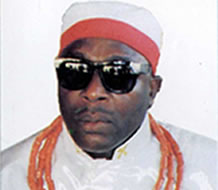The oldest man in citizenship qualification of a community is the Odionowere, maintained in stratified age-grade squads. The Odion-owere and his fellow elders-Edion, controlled access to community resources, keep order, settle disputes and mediate with central authority.

Enogie in Edoland
|
The elders directed the warriors in the olden days and executive grade of adult men-Ighele and the grade of youths- Iroghae which perform public works and supernatural sanction for their authority come from their access to the spirits of past elders - edion evbo and from their collective superiority.
The Enogie descended from past kings - Abie Ogie Vba evbo and few Enigie descended from non-royal appointees of the Oba of Benin Kingdom; and his office might consist |
of one or several villages.
Each village is directly with the central authority through its Odionowere, though it might combine with neighbouring villages for certain purposes.
The Enogie - Onogie’s authority was checked both from above and below. Each of his villages has its own council of elders headed by the Odion - owere and he could do little against their combine will. If his rule was oppressive they could appeal to the Oba.
The Oba settles cases of disputed succession and the Enogie’s heir can not be installed until the Oba had given permission. Generally, the heir spent a period of instruction at the Oba palace before he was escorted and presented to his community by palace officials.
In a community with both a hereditary - Enogie and non-hereditary - Odion-owere, the Enogié is the community’s representative and the central authority while the Odion-owere is concerned with the age grade organization and the internal affairs of the community.
The community council is made up of the Enogie, the Odionwere and the members of the Edion age grade, and apart from its judicial functions, the council discusses such topics as the collection of taxes, organization of collective tasks, festivals, and the relations with and instructions from the central authority.
In the traditional system the Edion are the repository of the law, customs and traditions of the community, led by the Odion owere and together with the Enogie constitute an administrative and judicial council for the community.
Any man who wishes to become Odion must seek the approval of the Senior Edion, the Odion-owere
and the Enogie. If they agree, the man then undergoes the rites.
The head of the whole age-grade organization is the Odion-owere. The Odionwere is the oldest free-born man in the community and in many communities this is indeed found to be the case.
There are factors in selecting an Odion owere, this includes whether the man’s father was born in the area, or whether the office is confined to candidates from the ward or from the different wards in rotation, or whether his seniority is judged on actual age than is being longest member of the Edion grade.
The Edion together with the Enogie make the final decision as to who should be the Odion-owere.
Generally the actual age in the stratified age squad is the best qualification for becoming an Odion owere, given that the man is a native of the community and belong to the right squad or ward.
In each community, the four elders - Edion n’ ene, seven elders - Edion n’ Ihinron, including the Odion owere are set apart from the rest Edion in status and respect.
These are always claimed to be the range in order of actual age. Non-native, impotents and otherwise incapacitated individual may be excluded.
Any of the Edion n’ ene or Edion n’ Ihinron may act in the Odion owere’s place in his absence. They occupy the most important position in the community meeting, rites at the shrine and at feasts. Their share is set aside from that of the rest of the Edion.
It is to them that a prospective candidate for promotion to the grade present gifts and when a house is about to be built they join together to pray for the site, otherwise they do not emerge conspicuously as a distinct group, though their status gives extra weight.
Relative seniority between those at the highest level in the age grade organization does not however, necessarily determine the order of succession to the office of Odion owere for the four or seven senior Edion may come from any ward in the community and may include non- native.
All wards have their own Odion owere who may have considerable administrative powers and if the ward worship its own shrine as distinct from the collective shrine of the whole community, he is their priest.
The Odion owere is primarily concerned with the age-grade organization, squad mates in which women are also part - Oyaghiroba, Akinna, Ehonsi, Uzamete, Oboghironmwen, Obokhae, Aiwarhenkpen and with internal affairs of the community
Odion owere age invests him with wisdom and knowledge of what has been handed down from the past Edion. He is the repository of the traditional laws and customs of the community.
The Enogie rules over a number of villages with one or more Odion owere for which he has general responsibility to the Oba and have right to tribute in kind and services. Both Odion owere and the Enogie are the integral hubs of the community in culture.